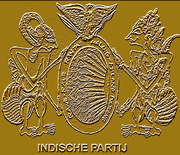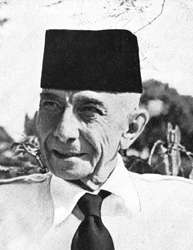Indische Party
The Indische Partij (IP) or Indies Party was a short lived (1912–1913) but influential political organisation founded in 1912 by the Indo-European (Eurasian) journalist E.F.E. Douwes Dekker and the Javanese physicians Tjipto Mangoenkoesoemo and Soewardi Soerjaningrat. As one of the very first political organisations pioneering Indonesian nationalism in the colonial Dutch East Indies it inspired several later organisations such as the ‘Nationaal Indische Party’ (N.I.P.) or ‘Sarekat Hindia’ in 1919 and, ‘Indo Europeesch Verbond’ (I.E.V.) in 1919. Its direct successor was 'Insulinde (Political Party)'.[1]
"Revolutionary action enables people to achieve their objectives quickly. Surely this is not immoral [...] The Indische Party can safely be called revolutionary. Such a word does not frighten us[...]" Douwes Dekker.[2]
Indies Party Indische Partij Partai Hindia | |
|---|---|
 | |
| Chairman | E. Douwes Dekker |
| Founder | E. Douwes Dekker Tjipto Mangoenkoesoemo Soewardi Soerjaningrat |
| Founded | 25 December 1912 |
| Dissolved | 1913 |
| Split from | Indische Bond |
| Succeeded by | Insulinde |
| Headquarters | Bandoeng, Dutch East Indies |
| Newspaper | De Express Het Tijdschrifc |
| Membership (1913) | 7.000 |
| Ideology | Indies nationalism Indo nationalism Independence |
| Political position | Big tent |
| Slogan | Indie voor Indiers |
Although short lived and accumulating a little over 7,000 members its influence as the first multi-racial political party that clearly stated the, at the time radical, notion of independence was far reaching. The IP’s aim was to unite all native peoples of the Indies in a struggle for an independent nation.[3] When the IP was banned and its leadership exiled, members of the IP founded the equally radical Insulinde.
1912:Foundation
Under the slogan of “Indie voor Indiers” membership was opened to Indo-Europeans, Dutch permanent settlers, Indo-Chinese natives and all indigenous peoples. Inspired by the leading role Eurasian Ilustrados had played in the independence struggle in the Philippines, the IP envisioned a similar uniting role for the Indo Eurasians in the Indies. Over 5,000 of its 7,000 members were Indos.[4]
“The coloured [Indo] rejected by his white father, is the ideal foreman in the final liberation of his indigenous relatives.” Douwes Dekker
Douwes Dekker however also warned the Indo community not to carry on the racist notions indoctrinated by the colonial system.

[...]colonial policy and its colonial morality are rotten. This is of course what the Indische Partij aims at in its struggle against racial superiority and racial discrimination [...] It will give the final push to make the tree of racial discrimination crash to earth [...] But when Indos of mixed blood complain about this racial superiority they must take care not to become guilty themselves of the same sin with respect to the indigenous natives. They must realize that artificially inculcated ideas of belonging to the ruling classes do by no means give them the right to look down on a class of (indigenous) Indiers with whom they are bound together with unbreakable chains [...] Douwes Dekker.[5]
In 1912 the removal of the Batavia school for Civil Servants from the Dutch East Indies and the ban on establishing a Medical school for Indo-Europeans and Indo-Chinese had contributed to a strong undercurrent of dissatisfaction and the IP membership numbers were rising speedily. Within a month the Party’s magazine had a 1,000 paying subscribers. In fear of a Malay language edition and collaboration with the ‘Sarekat Islam’ the colonial authorities stepped up its efforts to ban the IP.[6]
1913 Ban
When in July 1913 IP founder Tjipto was chairman of the ‘Bumi Putra’ committee and commissioned IP co-founder Soewardi’s famous ironic pamphlet ‘If I would have been a Dutchman.’ (Als Ik Een Nederlander Was) all 3 IP founders were put on trial.[7]
Explicitly and vigorously opposing widespread racial discrimination by the colonial elite of expatriate Dutchmen and advocating total independence from the Netherlands, the colonial government hastened to brand the political organisation as subversive and banned it only 1 year after its foundation.
Exactly 1 year after the foundation of the IP all 3 founders were exiled to the Netherlands. They were able to remain politically active and eventually return to the Dutch East Indies.[8] Tjipto became future president Sukarno's second political mentor, after an imprisonment in Banda he died in 1943. After Indonesia's declaration of independence in 1945 Douwes Dekker, now named Danoedirdja Setiaboeddhi, became minister of state in the cabinet of Indonesian prime minister Sjahrir. Soewardi became Indonesian minister of education in 1949, having changed his name to Ki Hadjar Dewantara in 1922.
Trivia
From 1994 to 2006 a political party named the 'Vrije Indische Party' (VIP) existed in the Netherlands. With a constituency of mainly first generation Indo and Dutch repatriates from the former Dutch East Indies its aim was to look after their interests which included care for the elderly and restitution of damages suffered during the war and Bersiap periods. [9][10][11]
See also
- P.F.Dahler
- Karel Zaalberg
References
Bibliography
- Meijer, Hans In Indië geworteld. De 20ste eeuw. (Publisher Bert Bakker, Amsterdam, 2004) P22-25 ISBN 90-351-2617-3
- Postma, Ulbe: Karel Zaalberg, journalist en strijder voor de Indo. (Publisher KITLV, Leiden, 1997.)
- Willems, Wim ”Sporen van een Indisch verleden (1600-1942) (COMT, Leiden, 1994) P53-70 ISBN 90-71042-44-8
External links
Notes and citations
- Willems, Wim ”Sporen van een Indisch verleden (1600-1942)”, Part II, Nomes, J.M. “De Indische Partij” (COMT, Leiden, 1994) P.55 ISBN 90-71042-44-8
- Pender, Chr. L. M. (ed. and translator) "Indonesia: Selected documents on colonialism and nationalism, 1830-1942" (University of Queensland Press, 1977) pp. 228–232 ISBN 0-7022-1029-3; ISBN 978-0-7022-1029-7
- Willems, Wim ”Sporen van een Indisch verleden (1600-1942)”, Part II, Nomes, J.M. “De Indische Partij” (COMT, Leiden, 1994) P.55-56 ISBN 90-71042-44-8
- Willems, Wim ”Sporen van een Indisch verleden (1600-1942)”, Part II, Nomes, J.M. “De Indische Partij” (COMT, Leiden, 1994) P.62 ISBN 90-71042-44-8
- Pender, Chr. L. M. (ed. and translator) "Indonesia: Selected documents on colonialism and nationalism, 1830-1942" (University of Queensland Press, 1977) pp. 228–232 ISBN 0-7022-1029-3; ISBN 978-0-7022-1029-7
- Willems, Wim ”Sporen van een Indisch verleden (1600-1942)”, Part II, Nomes, J.M. “De Indische Partij” (COMT, Leiden, 1994) P.57 ISBN 90-71042-44-8
- Willems, Wim ”Sporen van een Indisch verleden (1600-1942)”, Part II, Nomes, J.M. “De Indische Partij” (COMT, Leiden, 1994) P.62 ISBN 90-71042-44-8
- Willems, Wim ”Sporen van een Indisch verleden (1600-1942)”, Part II, Nomes, J.M. “De Indische Partij” (COMT, Leiden, 1994) P.63 ISBN 90-71042-44-8
- VIP profile from the Montesquieu Institute website.
- VIP profile at the official Dutch parliament website.
- Party programme 1994.